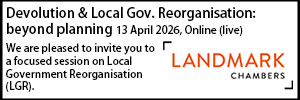Local government groups issue model motion for councils to show support for choice to hold remote and hybrid meetings
- Details
Five local government organisations including the Association of Democratic Services Officers (ADSO) and Lawyers in Local Government (LLG) have asked councils to consider passing a motion and writing to the Secretary of State for Levelling Up, Housing and Communities to show their support for local authorities to be able to hold remote and hybrid meetings.
Joining LLG and ADSO in making the call are the Centre for Governance & Scrutiny (CfGS), the National Association of Local Councils (NALC) and the Society of Local Council Clerks (SLCC).
The move comes on the back of ADSO and LLG launching a petition on a Change.org page last month which called for councils to be given the freedom to hold remote meetings when local circumstances suit. As of today (23 February) the petition has attracted 10,665 signatures.
The model motion put forward by the five groups states:
“This Council supports the petition launched by ADSO and LLG on 5 January with regard to remote and hybrid meetings. We agree to write to the Secretary of State for Levelling Up, Housing and Communities calling on the Government to change the law to allow councils the flexibility to hold such meetings when they deem appropriate within agreed rules and procedures.”
In April 2021 the Divisional Court clarified that meetings held by local authorities in England under the Local Government Act 1972 would have to take place in person from 7 May 2021 when emergency regulations introduced in the early stages of the first lockdown expired. The judgment set out that it was for Parliament to change the law not the courts.
Unveiling the proposed motion, ADSO, LLG, CfGS, NALC and SLCC said: “We do not wish to impose remote meetings on councils. You should have the choice to decide how you run your meetings depending on local circumstances. We also accept that some meetings (for example full council meetings) are more suited to physical attendance.”
The groups noted that the Government’s response to its call for evidence on 21 March 2021 was still awaited.
They said that the period of lockdown “showed that remote meetings bring so many benefits to local democracy and residents, apart from the obvious public health safeguards. It is no longer just a response to Covid, although we are aware that some councillors are still not able to attend meetings for health reasons either relating to them or their families.”
The groups cited a range of wider benefits including increased attendances at remote meetings by both councillors and the public, significant cost savings for some authorities, the environmental benefits of less travel, a better work/life balance for councillors, improved equality of access to meetings, more transparency and openness for the public to see council meetings, and an option to move meetings online when there are constraints, “for example bad weather such as snow or flooding”.
In a Parliamentary debate on 24 January 2022, Secretary of State Michael Gove said he was “strongly in sympathy with the view that hybrid meetings should continue in order to ensure the maximum amount of efficiency”.
He added: “There is a case for saying that certain significant local authority meetings should occur with all councillors present, but I want to proceed with the maximum amount of consensus to reflect the maximum level of efficiency and in particular of sensitivity to those who serve in constituencies.... where the rurality and dispersed nature of representation are important.”
Governance Officer/Company Secretary
Head of Legal Services / Deputy Monitoring Officer
Locums
Poll

















